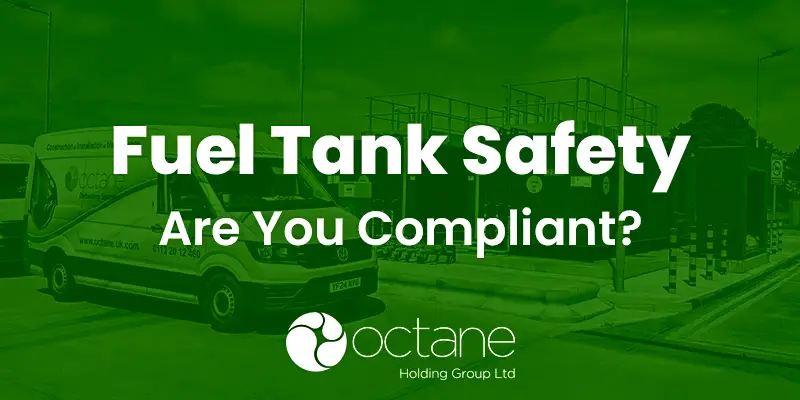Latest News
Keep up to date with latest news and insights from Octane Holdings

Fuel Tank Safety: Are You Compliant with UK Regulations?
Protecting Your Operations, People and the Environment
Fuel storage and fuel tank safety isn’t just good practice, it’s a legal obligation, It plays a vital role in operational integrity, environmental protection, and public safety.
Whether you’re managing a busy construction site, operating a commercial haulage fleet, or running a critical facility such as a data centre, airport, or MOD site,. The risks associated with poor fuel storage are significant, and so are the consequences.
From potential environmental contamination and equipment failure to regulatory fines and reputational damage, non-compliance with UK fuel storage regulations can have far-reaching effects. That’s why robust systems, regular inspections, and professional oversight are essential for any business storing fuel on-site.
We specialise in the design, installation, maintenance, and compliance management of fuel systems tailored to your operational needs. With decades of experience across some of the UK’s most demanding sectors, our end-to-end solutions. Ensuring that your storage infrastructure is safe, efficient, and fully compliant with the latest legislation.
In this article, we’ll cover the key regulations you need to know, the common pitfalls that put businesses at risk, and how our team can help you build, upgrade, or maintain fuel systems that stand up to scrutiny—today and in the future.

What Are the UK Regulations?
If you store more than 200 litres of fuel above ground, your site likely falls under the Control of Pollution (Oil Storage) (England) Regulations 2001. Tanks must be structurally sound, placed on impermeable surfaces, and equipped with secondary containment (bunds) holding at least 110% of the tank’s volume. Regular inspections are essential, especially when storing hazardous substances like diesel or gas oil.
Compliance Pitfalls to Avoid
Non-compliance can lead to costly fines, environmental damage, and reputational risk. We often encounter issues such as insufficient bunding, lack of inspection records, faulty overfill protection, and outdated or poorly installed pipework. We offer detailed site audits and compliance checks to ensure your infrastructure meets environmental and safety requirements.
Why Maintenance Matters
Even compliant systems degrade over time. Water ingress, corrosion, microbial contamination (diesel bug), and sludge can affect both fuel quality and tank integrity. Routine maintenance, like cleaning, fuel testing, and leak detection, extends the life of your system and protects the equipment it serves.

How Octane Can Help
We support clients across key sectors including defence, logistics, aviation, marine, and critical infrastructure. From initial design and installation to testing, commissioning, and servicing, we offer complete fuel management tailored to your site and operational needs.
The Bottom Line
If your tanks haven’t been checked recently or you’re unsure about current regulations, now is the time to act. Fuel safety is a shared responsibility. Trust Octane Holding Group to keep your systems compliant, reliable, and ready for the future.

